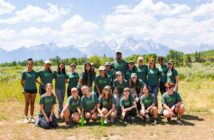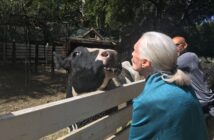Dr. Jane Goodall has always had a powerful connection to forests. Some of her most profound moments were spent alone in the forests of Gombe, Tanzania during her early studies of wild chimpanzees. She has often felt that the forest is her “cathedral,” and it is the peace of the forest that she carries with her as she spreads her message of hope. It is where it is easiest to see how every living thing on Earth has a role to play and is connected in this vast tapestry of life. Forests, it turns out, are also one of our greatest hopes in fighting the climate crisis and biodiversity loss. The best part? You can be a part of planting the seeds of hope for the future, today!
As we celebrate International Day of Peace with an emphasis on “Recovering Better for an Equitable and Sustainable World,” Dr. Goodall is proud to grow #JanesGreenHope a new coalition based campaign to advance sustainable, community-centered native tree and forest restoration, planting, and protection of global forests.
JGI’s Jane’s Green Hope initiative is in support of Trillion Trees to replenish global forests as a vital solution for the most pressing challenges we face today.
Why?
The climate crisis is the greatest existential threat of our time. Many communities and ecosystems are seeing increasing flooding, heat stress, water scarcity, extreme and destructive weather patterns, rising sea levels, and drought, which is causing immense suffering for humans and wildlife alike. Additionally, economic, gender, and racial inequities put marginalized communities at disproportionate risk as we face the worst of climate impacts. In response, Dr. Goodall and JGI are tackling the drivers of the climate crisis head on through advocacy and a direct efforts to grow a greener world for all.
From forests to the individual tree, plants are the “root” of our planet’s health and survival. Trees and other plants have the power to draw down from our atmosphere carbon dioxide (CO2), a heat-trapping gas released through human activities like burning fossil fuels and deforestation. By trapping CO2, forests and green spaces can be one of our greatest solutions in fighting climate change (U.S. Forest Service). Not only that, plants and forests provide oxygen, and improve the health of communities who live and work near them (ArborDay). There have even been studies on the tremendous mental health benefits (Washington Post)!
Global reforestation binds at least a quarter of the annual man-made CO2 emissions. Preventing the continued loss and degradation of forests and supporting sustainable and appropriate restoration could contribute to one-third of total climate change mitigation required by 2030. Restoring just 350 million hectares of forest could potentially sequester (offset) 1.7 gigatonnes of carbon dioxide equivalent annually (IUCN). This is a big deal, and there’s space to grow – by the campaign’s estimations, in total, an area the size of the United States could be reforested. In addition to important climate change legislation and convenings like COP26, greening our world represents an incredibly impactful way to ensure a healthy planet for all today, and tomorrow.
1.6 billion people depend on forests for their livelihood, including 70 million indigenous people.
80%+ of all terrestrial species of animals, plants and insects make forests their home.
3.3 million hectares of forest area lost between 2010 and 2015. Poor rural women are especially affected by their depletion.
What?
Trillion Trees offers innovative technologies which will serve to connect tens of thousands of small and large groups around the world that are engaged in tree planting and forest restoration. Creating this “greening global community”, will allow for sharing critically needed funding and best practices — just what is needed to achieve the trillion trees goal in ten years…Now is the time for everyone on the planet to do their part. – Dr. Jane Goodall, DBE, Founder of the Jane Goodall Institute, UN Messenger of Peace
Jane’s Green Hope & More Ways to Green Our World
#JanesGreenHope works to drive incredible community-centered native tree restoration, protection, and regeneration of global forests. Find out more about all the other ways to support Jane’s Green Hope at janegoodall.org/janesgreenhope. You can also support the efforts of our partners who are specifically focused on advancing our shared initiatives below.
JGI’s How to Responsibly Go Green Guide: Want to get started but aren’t sure how to begin? One of the biggest things to remember is to make sure the trees you’re planting are good for your area! Check out JGI’s guide to responsibly greening your community with more background, information about JGI’s work, and the step-by-step instructions on how to make this work a reality.

The Jane Goodall Institute is a global community conservation organization that advances the vision and work of Dr. Jane Goodall. By protecting chimpanzees and inspiring people to conserve the natural world we all share, we improve the lives of people, animals and the environment. Everything is connected—everyone can make a difference.









